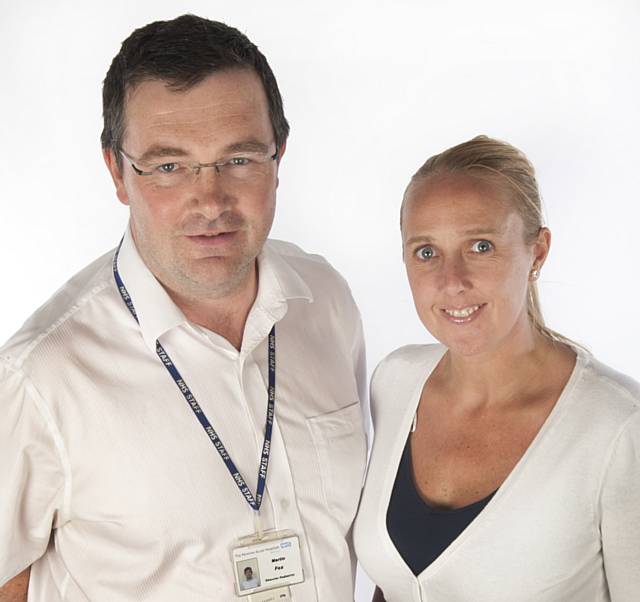‘Padding’ out a successful service with NICE backing
Date published: 05 August 2013

Martin Fox and Lisa Smith, vascular nurse specialist
The National Institute for Clinical Excellence (NICE) has hailed the peripheral arterial disease (PAD) service at The Pennine Acute Hospitals NHS Trust as an NHS service model that reflects best practice in a traditionally under diagnosed and under-managed killer disease.
PAD happens when arteries narrow, causing poor circulation. It normally affects arteries taking blood to the legs and one in five people over the age of 60 has it, without knowing about it. A serious and relatively common condition, if left untreated the effects can be irreversible and can often lead to a heart attack or stroke.
Poor outcomes for cardiovascular disease, an outdated service model and the need to manage resources more effectively, convinced a team of clinicians in North Manchester to redesign services for diagnosing, treating and managing peripheral arterial disease.
A team of vascular nurse specialists and podiatrists wanted to improve early detection and long term management of PAD and save costs by reducing unnecessary hospital referrals. Using the NICE guideline on lower limb peripheral arterial disease, a team of vascular nurse specialists and podiatrists commissioned a community based service which:
- Encouraged early referral of cases of PAD;
- Offered an appointment within one month, at a choice of five locations;
- Carried out non-invasive, PAD assessments and diagnosis;
- Educated patients on cardio vascular disease and the risks of not treating leg circulation disease;
- Worked with other teams to promote healthy living such as exercise and stopping smoking;
- Ensured severe or deteriorating cases were referred to vascular surgeons
Since setting the service up, the team has already begun to see positive results. Patient surveys have shown high levels of satisfaction with the choice of location, the prompt offer of appointments, the clinical treatment plans and the written and verbal information provided about PAD and the service.
They have also developed a database to help identify the PAD population, manage PAD patients in the community and devise individual treatment plans for them, involving their GP and other community teams.
Overall they found that, of the patients diagnosed with PAD, 80% could be managed in the community through GP care and healthy living programmes and only 20% needed to see a vascular specialist in hospital. This has resulted in a 40% cost saving to the health and social care system and has freed up hospital resources for those who need them more.
Martin Fox, vascular specialist podiatrist at The Pennine Acute Trust, said: “The majority of people with PAD can be managed successfully without surgical intervention, but when needed it is important to facilitate quick access to a vascular surgeon, particularly if the patient has developed a critical level of ischaemia (lack of blood supply) to the foot. By ensuring that only appropriate severity of PAD is referred on for surgical opinion, vascular outpatient clinics have more capacity to see the urgent or priority patients in a timely way.”
The team also provide home visits to those patients who can’t easily get to a community clinic.
Pennine Acute Trust vascular nurse specialist, Debbie Ruff, who played a key part in developing the service said: “Primarily patients with PAD can be assessed and treated effectively in the community by specialist staff who work in the leg circulation service. This service has raised the profile of PAD and has significantly improved the services for patients living in the North Manchester area.
“We work closely with the leg circulation service in ensuring that, where necessary, patients are referred to hospital for further investigations and treatment. This provides our patients with the best quality of care both in the hospital and community.”
The team recently won the Trust’s award for innovation at the 2013 staff awards, which were hosted by TV personality and comedian, Ruby Wax.
Do you have a story for us?
Let us know by emailing news@rochdaleonline.co.uk
All contact will be treated in confidence.
Most Viewed News Stories
- 1Rejection of plan for SEN school being appealed
- 2Rochdale Sixth Form College hits new high with twelve Oxbridge offers for students
- 3Appeal after man arrested on suspicion of multiple harassment incidents in Rochdale
- 4Community event to turn Wardle and Littleborough into 'magical outdoor gallery'
- 5The plan for 445-home estate in Castleton with only one access road
To contact the Rochdale Online news desk, email news@rochdaleonline.co.uk or visit our news submission page.
To get the latest news on your desktop or mobile, follow Rochdale Online on Twitter and Facebook.

